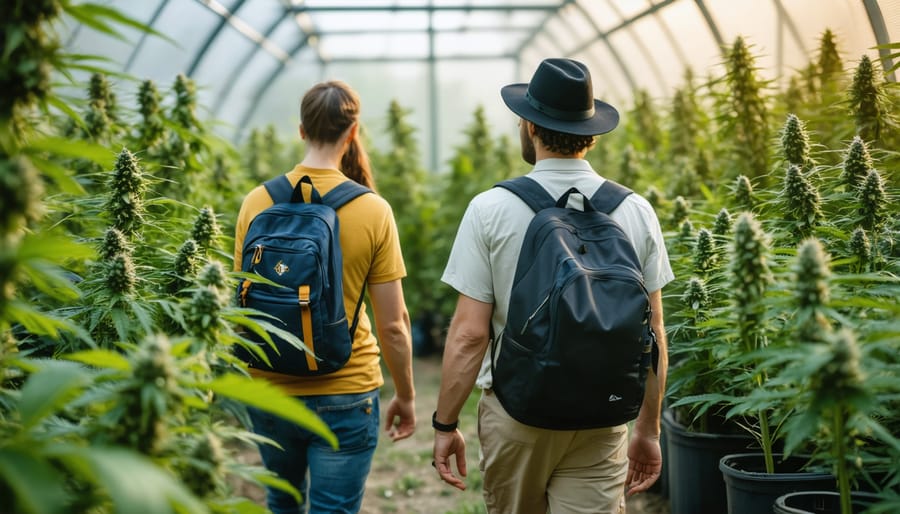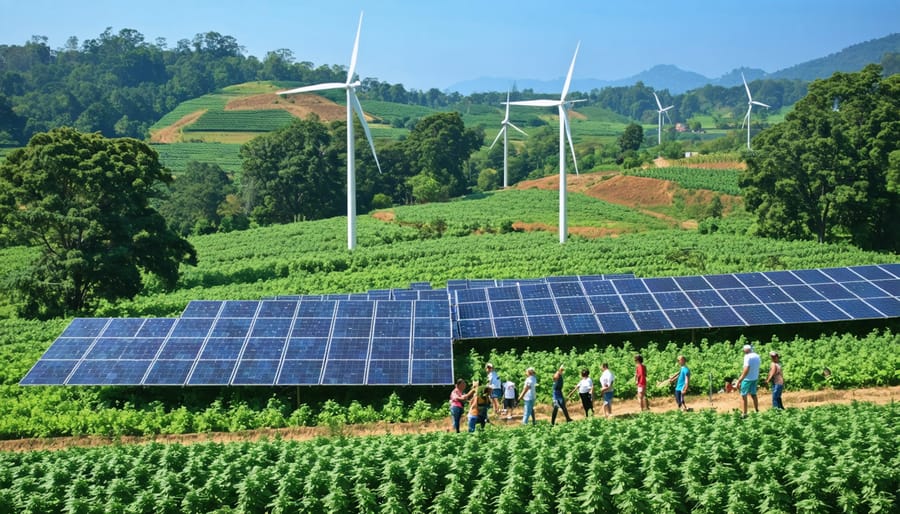As cannabis tourism evolves beyond delta-8 THC vape cartridges and dispensary visits, a remarkable transformation is reshaping the industry’s environmental footprint. Forward-thinking destinations are pioneering a new era of responsible cannabis tourism, where sustainability meets cultural authenticity and economic growth.
From regenerative farming practices in California’s Emerald Triangle to solar-powered greenhouse tours in Colorado, sustainable cannabis tourism represents a powerful intersection of conscious travel and environmental stewardship. This emerging sector generates an estimated $4.5 billion annually while creating opportunities for local communities to preserve their agricultural heritage and natural resources.
By embracing renewable energy, water conservation, and zero-waste practices, innovative cannabis tourism operators are setting new standards for responsible travel. These initiatives not only reduce the industry’s environmental impact but also create meaningful connections between visitors, local communities, and the natural world, demonstrating how thoughtful tourism can drive positive change in both established and emerging markets.
This revolutionary approach to cannabis tourism offers a blueprint for how the hospitality industry can balance economic growth with environmental responsibility, creating experiences that educate, inspire, and transform both visitors and host communities alike.
The Rise of Eco-Conscious Cannabis Tourism
Defining Sustainable Cannabis Tourism
Sustainable cannabis tourism represents a thoughtful evolution of the cannabis industry, integrating established sustainable tourism principles with responsible cannabis practices. At its core, this approach prioritizes three key elements: environmental stewardship, social equity, and economic viability.
Environmental sustainability in cannabis tourism encompasses energy-efficient cultivation methods, water conservation, waste reduction, and the use of organic growing practices. This includes implementing renewable energy solutions, minimizing packaging waste, and supporting local biodiversity.
The social component focuses on preserving local culture, ensuring fair labor practices, and fostering meaningful connections between visitors and host communities. This means creating opportunities for authentic cultural exchange while respecting traditional practices and local values.
Economic sustainability requires that cannabis tourism ventures benefit local communities directly through job creation, skills development, and revenue sharing. This includes supporting small-scale farmers, indigenous communities, and local businesses while ensuring that tourism profits are reinvested in community development.
Success in sustainable cannabis tourism demands collaboration between operators, local communities, and regulatory bodies to create experiences that protect both natural resources and cultural heritage while promoting responsible consumption.
Current Market Trends and Consumer Demand
Recent market research indicates a significant shift in cannabis tourism preferences, with over 60% of travelers expressing interest in environmentally responsible cannabis experiences. This growing trend aligns with broader sustainable tourism movements, as consumers increasingly seek authentic, eco-friendly adventures that minimize environmental impact while supporting local communities.
Industry surveys reveal that sustainable cannabis tourism operators who implement green practices report a 40% increase in bookings year-over-year. Visitors are particularly drawn to establishments that utilize renewable energy, practice water conservation, and maintain organic growing methods. Many are willing to pay premium prices for experiences that demonstrate clear environmental commitments and transparent supply chains.
The demand extends beyond just consumption experiences, with travelers showing keen interest in educational tours, workshops on sustainable cultivation practices, and opportunities to engage with local cannabis communities. This shift has prompted tourism operators to develop innovative programs that combine traditional cannabis experiences with environmental education and community engagement initiatives.
Rural communities, in particular, have seen a surge in interest from tourists seeking intimate, small-scale operations that emphasize sustainable practices and local cultural connections. This trend has created new opportunities for economic development while promoting responsible environmental stewardship.
Environmental Impact and Solutions

Carbon Footprint Reduction
Cannabis tourism operators are increasingly embracing innovative solutions to reduce their environmental impact, aligning with broader climate action in tourism initiatives. Leading facilities have implemented energy-efficient LED growing systems, reducing electricity consumption by up to 40% compared to traditional lighting methods. Water conservation plays a crucial role, with many operations adopting advanced hydroponic systems and rainwater harvesting techniques that can save millions of gallons annually.
Waste reduction strategies have proven particularly effective, with composting programs turning cannabis plant waste into nutrient-rich soil amendments. Several successful operations have partnered with local farms to create closed-loop systems, where organic waste becomes a valuable resource for nearby agricultural activities.
Transportation emissions are being addressed through the promotion of eco-friendly tour options, including electric vehicle shuttles and bicycle tours. Some innovative operators have established networks of nearby accommodations and experiences, reducing the need for long-distance travel between activities.
Packaging solutions have evolved to emphasize biodegradable materials and minimal waste. Progressive cannabis tourism businesses are utilizing hemp-based packaging alternatives and implementing container return programs that have achieved recycling rates exceeding 80% in some locations.
These initiatives not only reduce operational costs but also resonate strongly with environmentally conscious travelers who increasingly seek sustainable tourism experiences. The collective impact of these measures demonstrates how cannabis tourism can lead by example in sustainable business practices.
Waste Management and Resource Conservation
Cannabis tourism facilities are leading the way in innovative waste management solutions while setting new standards for resource efficiency. Through implementing responsible purchasing practices, facilities are significantly reducing their environmental footprint by choosing biodegradable packaging, reusable containers, and locally sourced materials.
Many successful cannabis tourism destinations have adopted comprehensive recycling and composting programs, converting plant waste into nutrient-rich soil amendments. These facilities often partner with local farms to create closed-loop systems where organic waste becomes a valuable resource for community agriculture.
Energy conservation plays a crucial role, with facilities incorporating LED lighting, solar panels, and energy-efficient HVAC systems. Implementing water conservation strategies has become paramount, with many operations installing rainwater harvesting systems, drip irrigation, and water recycling technologies that reduce consumption by up to 70%.
Digital solutions have helped minimize paper waste, with many facilities transitioning to electronic documentation and mobile-based tourist guides. Some pioneering destinations have established resource sharing networks, allowing multiple businesses to pool resources and reduce collective waste.
These initiatives not only reduce operational costs but also resonate strongly with eco-conscious tourists who increasingly seek out environmentally responsible experiences. The success of these programs demonstrates how cannabis tourism can lead by example in sustainable resource management.
Community Benefits and Social Responsibility
Economic Development
Sustainable cannabis tourism has emerged as a powerful driver of local economic development, creating diverse employment opportunities and stimulating regional growth. Communities that have embraced this industry have witnessed the creation of new jobs across multiple sectors, from cultivation and retail to hospitality and tour operations. For example, in Colorado, cannabis tourism has generated thousands of positions, ranging from budtenders and tour guides to agricultural specialists and sustainability consultants.
The economic impact extends beyond direct employment, fostering the growth of ancillary businesses such as eco-friendly packaging companies, sustainable transportation services, and green hospitality ventures. Local farmers markets and artisanal producers have found new opportunities to collaborate with cannabis businesses, creating unique farm-to-table experiences and locally sourced products.
Many regions have established cannabis business incubators and training programs, ensuring that local residents can participate meaningfully in the industry’s growth. These initiatives often prioritize sustainable practices and community involvement, helping small businesses compete effectively while maintaining environmental responsibility.
Tax revenues from regulated cannabis tourism have funded vital community projects, including environmental conservation efforts, public education programs, and infrastructure improvements. Several municipalities have directed these funds toward sustainability initiatives, creating a positive feedback loop that benefits both the environment and local economies.
The industry’s growth has also sparked innovation in sustainable agriculture and green technology, positioning many communities as leaders in eco-friendly business practices while attracting environmentally conscious investors and entrepreneurs.
Cultural Preservation
In the emerging landscape of cannabis tourism, preserving local cultural heritage while promoting responsible tourism practices has become increasingly important. Indigenous communities and traditional farmers have cultivated cannabis for generations, developing unique cultivation methods and cultural practices that deserve recognition and protection.
Successful cannabis tourism destinations are those that prioritize authentic experiences while respecting local traditions. In Jamaica, for instance, local cooperatives work with tour operators to showcase traditional growing techniques alongside modern sustainable practices, creating immersive experiences that honor the plant’s cultural significance while educating visitors about responsible consumption.
Communities in Thailand have developed programs that integrate cannabis heritage tours with traditional wellness practices, demonstrating how cultural preservation can enhance rather than compromise the tourist experience. These initiatives often include workshops led by local elders, storytelling sessions, and hands-on learning experiences that connect visitors with authentic cultural practices.
To maintain cultural integrity, many regions have established guidelines that ensure tourism development respects sacred spaces and traditional ceremonies. Local cannabis artisans are empowered to share their craft on their own terms, while tourism revenues directly support cultural preservation efforts and community development programs.
The key to successful cultural preservation lies in meaningful collaboration between tourism operators and local communities, ensuring that economic benefits flow back to traditional knowledge holders while maintaining the authenticity that makes cannabis tourism culturally significant.
Pioneering Sustainable Cannabis Experiences
Eco-Friendly Cannabis Tours
Several innovative tour operators are leading the way in environmentally conscious cannabis tourism. For example, Colorado’s Green Tours incorporates electric vehicles for guest transportation and partners exclusively with sustainable cannabis farms that use renewable energy and water-efficient irrigation systems. Their “seed-to-sale” tours educate visitors about organic growing practices while maintaining a zero-waste approach to tour operations.
In California’s Emerald Triangle, Humboldt Cannabis Tours showcases regenerative farming practices through visits to small-scale craft cultivators. Participants learn about companion planting, natural pest management, and soil conservation while supporting local farmers who prioritize environmental stewardship. The company offsets its carbon footprint by contributing to local forest preservation projects and uses digital materials instead of printed brochures.
Oregon’s Eco Cannabis Adventures has pioneered “leave no trace” cannabis tourism by implementing strict waste management protocols and providing guests with reusable water bottles and sustainable sampling containers. Their tours feature stops at solar-powered dispensaries and cultivation facilities that utilize rainwater harvesting and organic pest control methods.
In Canada, BC Green Tours combines cannabis education with environmental conservation by organizing beach cleanups and tree-planting activities as part of their tour packages. They work exclusively with licensed producers who maintain certified organic status and demonstrate commitment to reducing their environmental impact through innovative practices like using hemp-based packaging and implementing closed-loop cultivation systems.
These tour operators demonstrate that cannabis tourism can actively contribute to environmental conservation while providing enriching educational experiences for visitors. Their success proves that sustainability and profitability can go hand in hand in the cannabis tourism sector.

Sustainable Cannabis Accommodations
Innovative cannabis-friendly accommodations are leading the charge in sustainable tourism, offering unique experiences while minimizing environmental impact. From solar-powered eco-lodges in California’s Emerald Triangle to repurposed hemp-based tiny homes in Colorado, these properties demonstrate how hospitality can embrace both cannabis culture and environmental stewardship.
The emergence of “bud and breakfasts” has introduced a new paradigm in sustainable lodging. These establishments often feature organic hemp bedding, energy-efficient climate control systems, and water-saving fixtures. Many properties incorporate living walls and rooftop gardens, where guests can learn about sustainable cannabis cultivation alongside other organic farming practices.
Several standout properties have embraced circular economy principles. The Green Lodge Collective in Oregon, for example, composts cannabis waste into fertilizer for their on-site vegetable gardens, while their hemp-based building materials sequester carbon and provide natural insulation. Their rainwater harvesting system supplies both their cannabis grows and guest amenities, reducing water consumption by 40% compared to traditional hotels.
Community integration plays a crucial role in these accommodations’ sustainability strategies. Many properties partner with local organic cannabis farmers, offering farm tours and educational workshops that support regional economies while minimizing transportation impacts. Some establishments have pioneered “zero-waste” programs, working with local artists to transform cannabis packaging into creative installations and functional items.
These sustainable cannabis accommodations also prioritize energy independence through renewable sources. From hemp-based solar panels to biomass heating systems utilizing agricultural waste, these properties demonstrate how cannabis tourism can contribute to a cleaner energy future while providing unique, memorable experiences for conscious travelers.

As we look to the future of sustainable cannabis tourism, the intersection of responsible travel and cannabis cultivation presents unprecedented opportunities for positive change. The industry stands at a pivotal moment where conscious choices today will shape tomorrow’s landscape. Success stories from pioneering destinations demonstrate that when sustainability principles are thoughtfully integrated into cannabis tourism, communities thrive, environments flourish, and visitors gain enriching experiences.
The path forward requires commitment from all stakeholders. Tourism operators must continue developing eco-friendly practices, from energy-efficient growing facilities to waste reduction programs. Local governments can support this evolution through smart policies that protect both natural resources and community interests. Travelers, too, play a crucial role by choosing operators who prioritize sustainability and respecting local customs and regulations.
The potential for sustainable cannabis tourism to drive positive change extends beyond environmental benefits. It creates opportunities for economic development, cultural preservation, and social equity. By supporting indigenous growing practices, implementing fair labor standards, and investing in local communities, the industry can set new benchmarks for responsible tourism.
Now is the time for action. Whether you’re a tourism professional, policy maker, or conscious traveler, your choices matter. By embracing sustainable practices, supporting responsible operators, and advocating for environmental stewardship, we can ensure cannabis tourism becomes a model for sustainable development in the travel industry. Together, we can create a future where tourism enriches both destinations and visitors while preserving our planet for generations to come.

